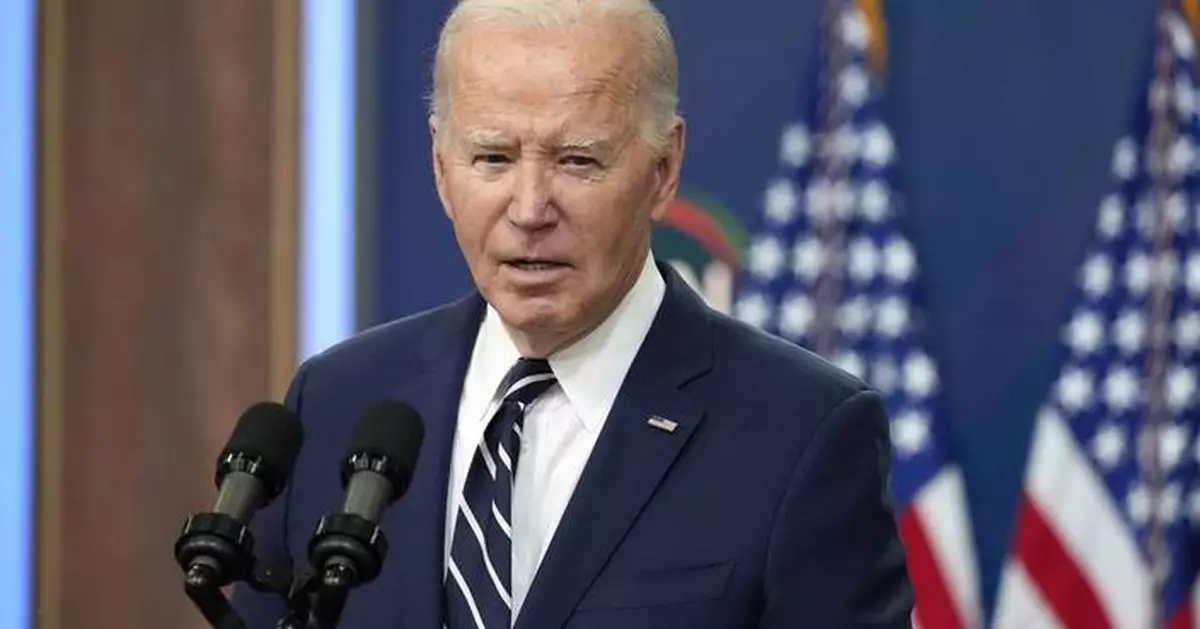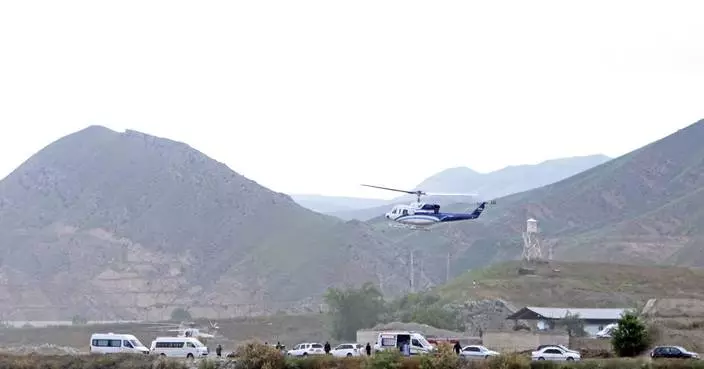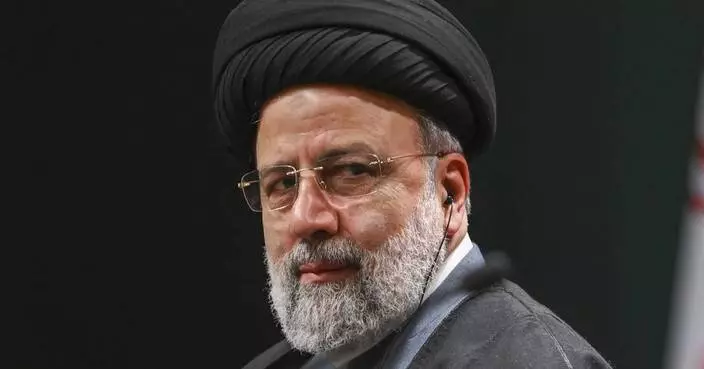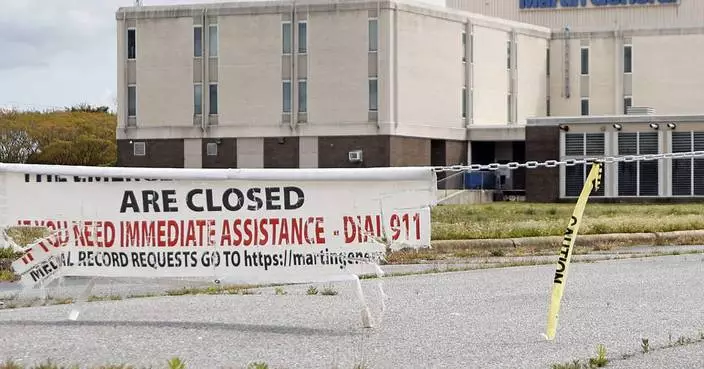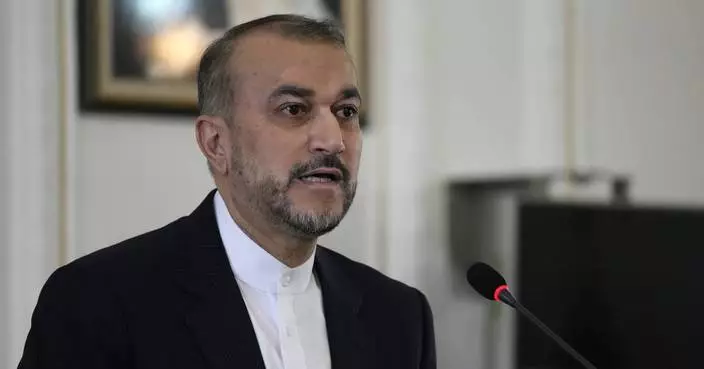COLUMBUS, Ohio (AP) — The question of whether Democratic President Joe Biden will appear on Ohio's fall ballot has become entangled in a partisan legislative fight to keep foreign money out of state ballot campaigns, a year after cash tied to a Swiss billionaire boosted a successful effort to enshrine abortion rights in the solidly red state's constitution.
On Wednesday, against the backdrop of a festering Republican leadership fight that’s roiled lawmaking since last year, Republican Secretary of State Frank LaRose’s proposal to ban foreign money from initiative campaigns became the poison pill that prevented a final solution for adjusting an Aug. 7 ballot deadline that precedes the Democratic National Convention.
Thursday marked the last day legislators could pass the fix with a simple majority, and no sessions were held.
All four Republican and Democratic leaders at the Statehouse still say they're confident the president will appear on Ohio's ballot. It's the how and when that remain a mystery.
Senate Republicans wanted to use Biden's predicament as leverage to pass a ban on foreign nationals contributing to ballot campaigns.
The legislation stemmed from the involvement in a pair of heated ballot campaigns last year of Hansjörg Wyss, a Swiss billionaire who has funneled hundreds of millions of dollars in recent years into 501(c) nonprofit organizations backing liberal U.S. political causes. A January report issued by LaRose found that over $207 million flowing from Wyss-backed entities went to three groups that, in turn, donated a combined $3.9 million to help pass November's Issue 1, the abortion measure, and to thwart an earlier proposed constitutional amendment that would have made passing it more difficult.
In order to garner the necessary Republican votes to help Biden out, Republican Senate President Matt Huffman said a compromise was struck to combine the foreign nationals legislation with the language adjusting the ballot deadline. Both proposals were folded into another bill allowing candidates to pay for child care with campaign funds.
After fractious debate, the measure cleared the Senate along party lines. Democrats called combining the measures “a dirty trick” and “the worst kind of politics.”
Huffman said: “Eventually Joe Biden is going to be on the ballot through whatever means. I think that’s fair for us to come together and also say no foreign money in Ohio elections.”
But GOP House Speaker Jason Stephens, who depends on the support of minority Democrats to keep his job, had been working on a different solution.
Stephens had in mind a “clean” bill that called for moving this year’s ballot deadline to Aug. 23, the day after Democrats' convention. It also included a long-term solution allowing extensions in future years when either party's nominating convention falls less than 90 days before the election.
This would be the third time since 2012 that Ohio has had to change its ballot deadline to accommodate conflicts faced by presidential candidates of both parties.
But that House plan stalled after it was informally passed, and when Stephens declined to call a vote on the Senate's ballot fix, the chamber erupted. Fellow Republicans aligned against Stephens jeered and booed. Some cried, “Shame!”
LaRose, who initially identified the calendar glitch, issued a statement condemning the House's inaction. Though the chamber's majority is Republican, he said it appeared that “Democrats are more interested in protecting foreign billionaires who want to bankroll Ohio's elections than in getting their presidential candidate on the ballot.”
He pointed out that the House still has time to act with an emergency vote, which requires a two-thirds majority and allows a bill to become effective immediately.
On Thursday, LaRose took his criticism further — bringing up Wyss by name.
“There’s one person at this point who’s responsible for keeping Joe Biden off the ballot in Ohio, and it’s a Swiss billionaire you’ve probably never heard of,” he said in a statement. He alleged Democrats have "become dependent on Wyss’s dark money to fund everything from their ballot campaigns to their fake news operations.”
State Sen. Bill DeMora, a Columbus Democrat, accused LaRose of politicizing his office and said blaming Democrats for the lack of a ballot resolution is “almost so sad it's funny.”
”It is not the Democrats’ fault that the Republicans are infighting and can’t govern, but the Secretary is just trying to please right-wing extremists instead of doing his job to avoid further embarrassment," he said in a statement. "This debacle falls squarely on the MAGA cult Republican supermajority in both chambers who only hold power because of the unconstitutionally gerrymandered maps that LaRose voted for."
Wyss was born in Bern, Switzerland in 1935. He now lives in Wyoming.

FILE - President Joe Biden speaks on April 12, 2024, in Washington. Lawmakers in Ohio have failed to come to agreement on adjusting a state election deadline that stands to prevent President Joe Biden from appearing on 2024 ballots by the deadline Thursday, May 9, 2024. The cutoff to make Ohio’s ballot is Aug. 7, two weeks before the Democratic National Convention. (AP Photo/Alex Brandon, File)
JERUSALEM (AP) — The helicopter crash in which Iranian President Ebrahim Raisi, the country’s foreign minister and other officials were killed is likely to reverberate across the Middle East, where Iran’s influence runs wide and deep.
That's because Iran has spent decades supporting armed groups and militants in Lebanon, Syria, Iraq, Yemen and the Palestinian territories, allowing it to project power and potentially deter attacks from the United States or Israel, the sworn enemies of its 1979 Islamic Revolution.
Tensions have never been higher than they were last month, when Iran under Raisi and Supreme Leader Ayatollah Ali Khamenei launched hundreds of drones and ballistic missiles at Israel in response to an airstrike on an Iranian Consulate in Syria that killed two Iranian generals and five officers.
Israel, with the help of the United States, Britain, Jordan and others, intercepted nearly all the projectiles. In response, Israel apparently launched its own strike against an air defense radar system in the Iranian city of Isfahan, causing no casualties but sending an unmistakable message.
The sides have waged a shadow war of covert operations and cyberattacks for years, but the exchange of fire in April was their first direct military confrontation.
The ongoing war between Israel and Hamas has drawn in other Iranian allies, with each attack and counterattack threatening to set off a wider war.
It's a combustible mix that could be ignited by unexpected events, such as Sunday's deadly crash.
Israel has long viewed Iran as its greatest threat because of Tehran's controversial nuclear program, its ballistic missiles and its support for armed groups sworn to Israel's destruction.
Iran views itself as the chief patron of Palestinian resistance to Israeli rule, and top officials for years have called for Israel to be wiped off the map.
Raisi, who was a hard-liner viewed as a protégé and possible successor of Khamenei, chastised Israel last month, saying “the Zionist Israeli regime has been committing oppression against the people of Palestine for 75 years.”
“First of all we have to expel the usurpers, secondly we should make them pay the cost for all the damages they have created, and thirdly, we have to bring to justice the oppressor and usurper," he said.
Israel is believed to have carried out numerous attacks over the years targeting senior Iranian military officials and nuclear scientists.
There is no evidence Israel was involved in Sunday's helicopter crash, and Israeli officials have not commented on the incident.
Arab countries on the Persian Gulf have also long viewed Iran with suspicion, a key factor in the decision of the United Arab Emirates and Bahrain to normalize relations with Israel in 2020, and of Saudi Arabia to consider such a move.
Iran has provided financial and other support over the years to the Palestinian militant group Hamas, which led the Oct. 7 attack into Israel that triggered the Gaza war, and the smaller but more radical Palestinian Islamic Jihad, which took part in it. But there is no evidence that Iran was directly involved in the attack.
Since the start of the war, Iran's leaders have expressed solidarity with the Palestinians. Their allies in the region have gone much further.
Lebanon's Hezbollah militant group, Iran's most militarily advanced proxy, has waged a low-intensity conflict with Israel since the start of the Gaza war. The two sides have traded strikes on a near-daily basis along the Israel-Lebanon border, forcing tens of thousands of people on both sides to flee.
So far, however, the conflict has not boiled over into a full-blown war that would be disastrous for both countries.
Iran-backed militias in Syria and Iraq launched repeated attacks on U.S. bases in the opening months of the war but pulled back after U.S. retaliatory strikes for a drone attack that killed three American soldiers in January.
Yemen's Houthi rebels, another ally of Iran, have repeatedly targeted international shipping in what they portray as a blockade of Israel. Those strikes, which often target ships with no apparent links to Israel, have also drawn U.S.-led retaliation.
Iran's influence extends beyond the Middle East and its rivalry with Israel.
Israel and Western countries have long suspected Iran of pursuing nuclear weapons in the guise of a peaceful atomic program in what they see as a threat to non-proliferation everywhere.
Then-President Donald Trump's withdrawal from a landmark nuclear pact between Iran and world powers in 2018, and his imposition of crushing sanctions, led Iran to gradually abandon all the limits placed on its program by the deal.
These days, Iran is enriching uranium to up to 60% purity — near weapons-grade levels of 90%. Surveillance cameras installed by the U.N. nuclear agency have been disrupted, and Iran has barred some of the agency's most experienced inspectors. Iran has always insisted its nuclear program is for purely peaceful purposes, but the United States and others believe it had an active nuclear weapons program until 2003.
Israel is widely believed to be the only nuclear-armed power in the Middle East but has never acknowledged having such weapons.
Iran has also emerged as a key ally of Russia following its invasion of Ukraine, and is widely accused of supplying exploding drones that have wreaked havoc on Ukraine's cities. Raisi himself denied the allegations last fall in an interview with The Associated Press, saying Iran had not supplied such weapons since the outbreak of hostilities in February 2022.
Iranian officials have made contradictory comments about the drones, while U.S. and European officials say the sheer number being used in the war in Ukraine shows that the flow of such weapons has intensified since the war began.

In this photo provided by Moj News Agency, rescue teams' vehicles are seen near the site of the incident of the helicopter carrying Iranian President Ebrahim Raisi in Varzaghan in northwestern Iran, Sunday, May 19, 2024. A helicopter carrying President Raisi, the country's foreign minister and other officials apparently crashed in the mountainous northwest reaches of Iran on Sunday, sparking a massive rescue operation in a fog-shrouded forest as the public was urged to pray. (Azin Haghighi/Moj News Agency via AP)

An Iranian woman prays for President Ebrahim Raisi in a ceremony at Vali-e-Asr square in downtown Tehran, Iran, Sunday, May 19, 2024. A helicopter carrying President Raisi, the country's foreign minister and other officials apparently crashed in the mountainous northwest reaches of Iran on Sunday, sparking a massive rescue operation in a fog-shrouded forest as the public was urged to pray. (AP Photo/Vahid Salemi)

People pray for President Ebrahim Raisi in a ceremony at Vali-e-Asr square in downtown Tehran, Iran, Sunday, May 19, 2024. A helicopter carrying President Raisi, the country's foreign minister and other officials apparently crashed in the mountainous northwest reaches of Iran on Sunday, sparking a massive rescue operation in a fog-shrouded forest as the public was urged to pray. (AP Photo/Vahid Salemi)

FILE - People gather around a component from an intercepted ballistic missile that fell near the Dead Sea in Israel, Saturday, April 20, 2024. The apparent crash of a helicopter carrying Iranian President Ebrahim Raisi, the country's foreign minister and other top officials is likely to reverberate across the Middle East. Tensions have soared since the start of the Israel-Hamas war, and Israel and Iran directly traded fire for the first time ever in April. (AP Photo/Itamar Grinberg, File)

FILE - Iranian worshippers chant slogans during an anti-Israeli gathering after Friday prayers in Tehran, Iran, Friday, April 19, 2024. The apparent crash of a helicopter carrying Iranian President Ebrahim Raisi, the country's foreign minister and other top officials is likely to reverberate across the Middle East. Tensions have soared since the start of the Israel-Hamas war, and Israel and Iran directly traded fire for the first time ever in April. (AP Photo/Vahid Salemi, File)



